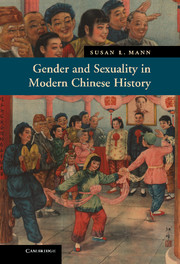Book contents
- Frontmatter
- Contents
- Figures
- Acknowledgments
- Preface: Does Sex Have a History?
- Introduction: The cloistered lady and the bare stick
- Part I Gender, Sexuality, and the State
- PART II GENDER, SEXUALITY, AND THE BODY
- Part III Gender, Sexuality, and the Other
- 7 Same-sex relationships and transgendered performance
- 8 Sexuality in the creative imagination
- 9 Sexuality and the Other
- Conclusion: Gender, sexuality, and citizenship
- Afterword: Gender and sexuality: useful categories of historical analysis?
- Permissions
- References
- Index
Afterword: Gender and sexuality: useful categories of historical analysis?
from Part III - Gender, Sexuality, and the Other
Published online by Cambridge University Press: 05 June 2012
- Frontmatter
- Contents
- Figures
- Acknowledgments
- Preface: Does Sex Have a History?
- Introduction: The cloistered lady and the bare stick
- Part I Gender, Sexuality, and the State
- PART II GENDER, SEXUALITY, AND THE BODY
- Part III Gender, Sexuality, and the Other
- 7 Same-sex relationships and transgendered performance
- 8 Sexuality in the creative imagination
- 9 Sexuality and the Other
- Conclusion: Gender, sexuality, and citizenship
- Afterword: Gender and sexuality: useful categories of historical analysis?
- Permissions
- References
- Index
Summary
In their close reading of the romantic drama The Western Wing, Stephen West and Wilt Idema paused to wonder why scholars had done so little historical research on the rich field of Chinese sexuality (1991:141–153). They blamed Confucianism and Marxism:
In China the ascendancy of neo-Confucianism after the fifteenth century, if it did not silence the earthy voice of Chinese vernacular literature, at least drove it into a kind of silent limbo. In modern China an interest in sex is officially attributed to bourgeois decadence. While traditional critics are wont to shunt the issue aside by simply saying that a certain passage is “vulgar” (li 俚), the silence of modern scholars, as philologically gifted as they are, is surely due to the fact that they too are heirs to the neo-Confucian tradition. (1991:141)
Anyone can see their point: just try checking the index of standard textbooks and sourcebooks on premodern (or modern!) Chinese history for the words “sex” and “sexuality.” Never mind that China's earliest philosophers were fascinated by sexual appetites, or that China's government has been constantly engaged in the process of regulating and prescribing sexual behavior. Historians seem not to be paying attention.
- Type
- Chapter
- Information
- Gender and Sexuality in Modern Chinese History , pp. 199 - 200Publisher: Cambridge University PressPrint publication year: 2011



